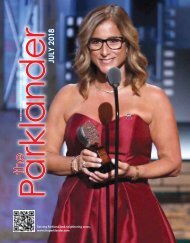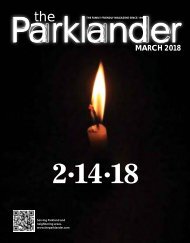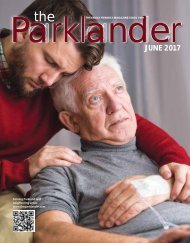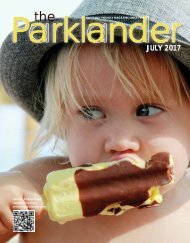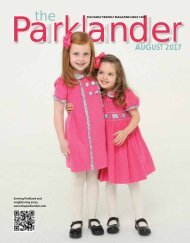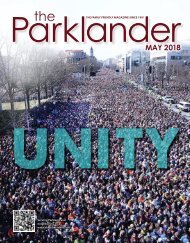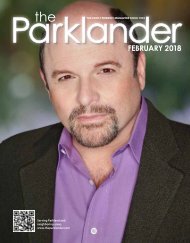May2015
Create successful ePaper yourself
Turn your PDF publications into a flip-book with our unique Google optimized e-Paper software.
COMMON<br />
GROUND<br />
How Effective Is Religious School?<br />
by Rabbi Melissa Stollman<br />
As the director of Lifelong Learning at Congregation Kol<br />
Tikvah I am charged with providing Jewish educational<br />
experiences, mostly in formal classroom settings, for<br />
children from preschool to high school. As such I find myself<br />
often asking, how effective is supplemental religious education<br />
in instilling faith-based values, a strong sense of religious<br />
identity, and a deep understanding of religious history and<br />
traditions?<br />
Supplemental religious school faces many obstacles in the<br />
21st century. Competition for a student’s time is ever present<br />
as children feel pressured to participate in sports and<br />
extracurriculars or spend additional time doing homework.<br />
It’s not that Jewish education is not a priority, but that these<br />
other demands often need to be met first.<br />
However, putting religious education on the back burner<br />
often leaves a vacuum for how, and from whom, a child<br />
should learn important Jewish values, such as tikkum olam<br />
(repairing the world), tzedakah (acts of charity), and g’milut<br />
chasidim (acts of loving kindness). This is at a time when<br />
children are developing their core sense of identity and starting<br />
to individuate from their parents.<br />
In liberal Jewish life the notion of “commanded-ness”<br />
does not always resonate. We are no longer a society of<br />
“have to” but one of “choose to.” Synagogue affiliation<br />
and religious school fall into this category. Therefore, our<br />
teaching strategy is to expose students to Jewish history<br />
and traditions, Hebrew language, and prayer. We focus on<br />
exploration, questioning, understanding, and practice. This<br />
helps students to develop their own sense of Jewish identity,<br />
belonging to the Jewish people, and a belief in God. These<br />
things cannot be taught explicitly, but evolve over time and<br />
are best integrated into one’s sense of self as a child matures<br />
into a young adult. Therefore, the role of effective supplemental<br />
Jewish education is to teach a core competence of what<br />
it means to be a liberal Jew and to instill a sense of confidence<br />
about being a Jew, which in turn gives that person a<br />
strong sense of conviction and Jewish belief. P<br />
Rabbi Melissa Stollman is the director of Lifelong Learning at<br />
Congregation Kol Tikvah in Parkland.<br />
by Father Thomas Wisniewski<br />
In Mary Help of Christians as in many Catholic<br />
parishes, there are a variety of ways to educate the<br />
members of the parish. We are fortunate to also<br />
have a school to assist with the religious education<br />
of the parish. Supplemental religious education,<br />
though, is not solely for the children or teens; there<br />
are ways for adults as well to enrich their faith and the<br />
understanding of the same.<br />
Speaking to the youth of the parish, most notably<br />
those of primary or middle school age, we have a<br />
faith formation on a daily basis in the school. For<br />
children who are in the public school system we have<br />
weekly faith formation sessions. The curriculum for<br />
both is determined on a national level ultimately by the<br />
bishops of the United States. The course of study is<br />
age-appropriate and covers not only doctrine – what<br />
we believe as Catholics – but also why we believe<br />
what we do. However, not all education is classrelated.<br />
The most important part of faith formation is<br />
the celebration of who we are in word and sacrament.<br />
What is learned supports and strengthens and helps<br />
us understand who we are. It is who we are as we<br />
come together in Sunday Eucharist that is the fullest<br />
expression of our life in Christ.<br />
Ultimately, though, all supplemental education is to<br />
reinforce the faith life learned in and through the family.<br />
The Baptism rite in the Church states the following: “...<br />
you are accepting the responsibility of training them<br />
(your children) in the practice of the faith. It will be your<br />
duty to bring them up to keep God’s commandments<br />
as Christ taught us, by loving God and our neighbor.<br />
Do you clearly understand what you are undertaking?”<br />
The family lives the life of Christ for one another.<br />
Religious education seeks to strengthen and bring a<br />
fundamental understanding to the reality of that life and<br />
what it means to our world. P<br />
The Rev. Thomas Wisniewski is the pastor of Mary<br />
Help of Christians Roman Catholic Church in<br />
Parkland.<br />
122<br />
MAY 2016




